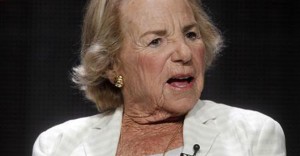 Rory Kennedy was born to tell her mother’s tale, though she resisted doing for many years. And while she’s directed or produced more than 35 documentaries, she’s never told one about her family – one that holds a unique fascination for Americans.
Rory Kennedy was born to tell her mother’s tale, though she resisted doing for many years. And while she’s directed or produced more than 35 documentaries, she’s never told one about her family – one that holds a unique fascination for Americans.
“I didn’t really want to do it, mostly for personal reasons,” she told reporters at the TV Critics press tour in August. “I didn’t want to ask my mother and my siblings to kind of go through some of the difficult moments that have been part of our history. Even though there have been some really wonderful moments and moments to celebrate, there have also been some tough moments.”
But HBO Documentary Chief Sheila Nevins kept asking. “Sheila was very persistent and insisted on it,” Kennedy says. “Then I asked my mother, and she said she would do it. And I know she hasn’t done an interview in 20 or 25 years. So, you know, I know it said a lot that she was willing to do it, so I jumped into it.”
The result is the revealing documentary “Ethel” premiering tonight on HBO shining a light on the widow of Robert F. Kennedy, now 84. Rory Kennedy was the 11th and final child of RFK; Ethel was pregnant with her when he was shot in 1968.
The plethora of siblings to talk to and the reels of family footage shared makes “Ethel” a warm family portrait, even though the reserved Ethel Kennedy is reluctant to share much, even with her own daughter.
Still, the film inadvertently shows the patrician life they led – with adult children continuing to call their parents “mummy and daddy,” the endless football on wide expanses of lawn, the horseback riding, the boats at the compound.
It also shows key moments in history, from JFK’s presidency and death, to a Senate run, to a decision to run for president by RFK and the many moving nights he had on the campaign trial as he embodied the hopes of a nation shattered by events of the 60s.
“One of the great gifts for me is having now done this, is being able to sit down with my mother to do an interview with her over the course of five days and with all of my siblings and be able to ask them every question that I’ve ever wanted to ask,” Kennedy said. “There were a lot of things that I did learn along the way that were really valuable to me, both about my mother as well as about them.”
And the project grew.
“Initially it was conceived of as a one hour documentary that was just focused on my mother. It was going to be kind of ‘In Her Own Words’ and doing some balance of archival footage and present day because my mother is so active today in so many issues, and she gets out there, and there’s so many great stories about her today,” she said.
“But then as I went through the archival material and saw how present my mother was in every significant historical event in the 1960s particularly. Whether it was Jack’s first congressional campaign, to his Senate campaign, to his 1960 campaign for the Presidency, to the inauguration, the many the hearings, the McCarthy hearings, she was there.
“I felt like the story was really in that footage and wanting to explore that and understand what it was like to be at the front lines of that and felt that I really had to include my siblings’ voice in it as well.”
Like her, most had ended up as activists, something their mother encouraged in them.
“Well, first of all, if there’s a formula for bringing up children, I really don’t know what it is,” Ethel Kennedy said at her press conference before TV critics in August – her first press conference in decades. “I just think we were very fortunate. And I’m so proud that they really are each involved in helping somebody in need.
“We had a Sunday evening tradition at meals in which everyone going around the table had to tell something about what was going on in the world,” she says. “It was an adult conversation and they responded beautifully.”
Though she adds that there was likely “ a little rush just before dinner: Find a paper and find out what the heck is going on.
“But I think it helped make them aware that there are a lot of people out there who don’t live the way they live, and who need help. And I think those sessions really helped motivate them. And it was what they were saying, as much as anything I said, probably more. But I think also, there wasn’t a great divide between children and grownups. It was the children who spoke. And maybe that’s why they can all speak so well publicly.”
Asked what she learned in the interview sessions for the film, Ethel Kennedy said, “Well, how amazingly brilliant and fun to be with” her daughter is. “She is really the best.”
Said Rory Kennedy, “Thank you, Mummy.”